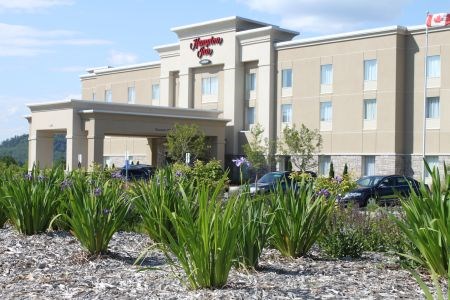When the Hampton Inn was constructed in Elliot Lake in 2009, its primary purpose was to serve Elliot Lake Retirement Living by housing visitors contemplating a move to the city.
Less than two years later, the hotel is still meeting those needs, but is also filling a niche for travellers who arrive in the city for business.
Setting up a Hampton was a big move for the city, since the qualifications needed to land and keep the flag are some of the most stringent in the industry. But the work has been worth it, since the brand brings with it a prestige that has been good for business, said General Manager Scot Reinhardt.
“It's very important to the city that we stay relevant, that we start to build new infrastructure, and that we fight a little bit above our weight, too,” he said.
Reinhardt said a full 30 per cent of his clients are there for business travel, while an additional 30 per cent are with government. While conferences and conventions aren't target markets for the hotel, the facility is well-equipped to meet the needs of business and industry looking for a place to meet.
The 52-room non-smoking facility, located along the city's main thoroughfare, Highway 108, overlooks picturesque Horne Lake.
Its 1,800-square-foot meeting room, which can accommodate up to 120 people, is equipped with a number of amenities, including LCD projectors, retractable screens and a sound system. The room can also be divided in two to accommodate two events simultaneously, and its patio doors open onto a deck that lends itself to breaks during long brainstorming sessions.
The meeting room is larger than those in most Hampton Inns, and it even has an attached warming kitchen, which comes in handy for catered events.
While there isn't a restaurant on site, the hotel does offer clients a complimentary breakfast, which is served in the breakfast room just off the front desk, or guests can enjoy their morning repast outside on a large deck overlooking the lake.
It's these nuances that are unique to the Elliot Lake site that make it a popular choice, Reinhardt said.
“In our case, we built a Hampton that, even though it's a branded design, we were able to incorporate some really unique features that are not typical of most Hamptons, which gives us quite the advantage in terms of what we can offer, and serving the needs of the community as well,” he said.
Reinhardt, who worked in the private sector before taking on hotel management, said he's seen a noticeable and welcome trend amongst business travellers since the Hampton opened. Whereas they formerly timed their trips to pass through Elliot Lake, favouring a stay in Sudbury or Sault Ste. Marie, more guests are choosing to time their travels so they can stay at the Hampton Inn.
“It went from a drain to a value-producing area,” Reinhardt said, noting the trickle-down effect means that more travellers are eating in local restaurants and even spending in local retail shops.
Future plans for the hotel don't include actively pursuing the conference and convention market, but Reinhardt does believe there is growth potential amongst government ministries and agencies.
It used to be rare to see government reps staying in the city, since they were accustomed to a specific type of accommodation, but that's slowly starting to change.
“Government agencies and ministries won't avoid Elliot Lake anymore,” he said. “They will come here and they are coming here.”
In the wake of high gas prices and other cost-prohibitive factors, he does anticipate an overall reduction in business travel in lieu of teleconferencing and videoconferencing. He predicts fewer business meetings in large urban centres like Toronto and more mini-meetings in smaller, regional centres, which will be patched in to larger meetings elsewhere.
Similar to a “staycation,” which sees vacationers stay within 300 miles of home, a mini-meeting will drastically reduce the amount of travel for companies, Reinhardt said.
When that shift does occur, the city will be poised to benefit from the change.
“Hotels are all about travel, so when there's a reduction in travel, somewhere in the industry there's a contraction,” Reinhardt said. “Can Elliot Lake benefit from that? Probably.”
The Hampton Inn is now in the thick of its busy season, and Reinhardt undergoes a bit of a balancing act this time of year as he tries to simultaneously meet the needs of his Elliot Lake Retirement Living clients while satisfying business and pleasure travellers. But he must be doing something right.
Last year the Hampton Inn was named the top hotel outside of the United States, a coup not easily afforded by the parent company, as the title is bestowed based on a combination of customer feedback and twice-yearly inspections.
It's a welcome compliment for the hard work staff has put in over the last year and a half, and reinforces the Hampton Inn was the right way to go.
“The hotel could have been profitable as an independent, but you don't get the same recognition and cachet with an independent as you do with a Hampton,” Reinhardt said. “That cachet brings you more than just money. It says something about your community too. 'There's something going on in Elliot Lake. There's a Hampton there.'”




